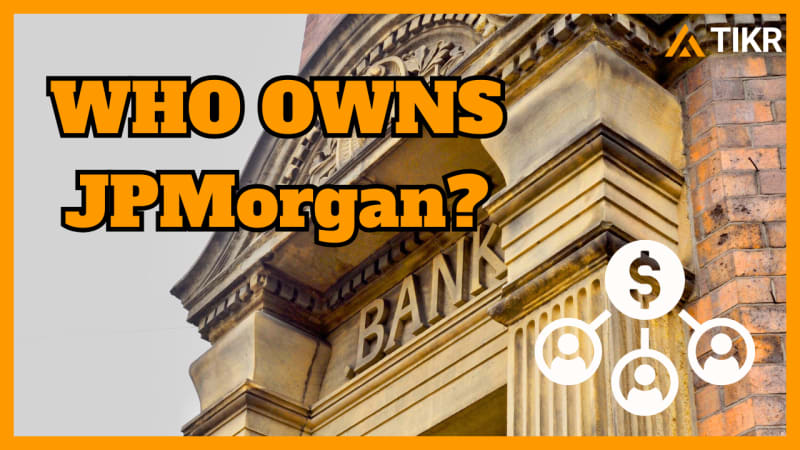JPMorgan Chase & Co. (NYSE: JPM) is the largest U.S. bank, recently trading around $290 per share with a market cap near $799 billion. As a financial powerhouse, it serves millions of retail customers, businesses, and governments through consumer banking, credit cards, wealth management, and investment banking. Over the past year, the stock has climbed 37.3%, reflecting strong returns on equity, resilient earnings, and steady dividend growth.
Powered by its scale, diversified revenue streams, and leadership under CEO Jamie Dimon, JPMorgan has cemented itself as the go-to banking stock for institutions seeking both stability and exposure to global finance. Its dominant position across lending, payments, and capital markets gives it advantages that smaller peers simply cannot match.
For investors, looking at who actually owns JPMorgan is a way of seeing how the biggest players on Wall Street are positioning themselves, whether they are quietly trimming or leaning in for the long haul.
Who are JPMorgan’s top shareholders?

Track the top shareholders of over 50,000 global stocks (It’s free) >>>
JPMorgan’s shareholder base is dominated by the world’s largest asset managers, reflecting its role as a core holding in global portfolios. Passive giants like Vanguard, BlackRock, and State Street hold substantial stakes, while active managers and sovereign wealth funds adjust their positions around the edges.
Most of $JPM’s top shareholders are reducing their positions:
- Vanguard Group: 270.7M shares (9.84%), worth $78.6B. Trimmed 0.32%.
- BlackRock: 132.6M shares (4.82%), worth $38.5B. Reduced 2.4%.
- State Street: 125.3M shares (4.56%), worth $36.4B. Cut 1.75%.
- Geode Capital: 61.1M shares (2.22%), worth $17.8B. Added 0.49%.
- Fidelity: 39.3M shares (1.43%), worth $11.4B. Cut 8.3%.
Other moves: Norges Bank added 841K shares, while BofA Global Research raised its stake 18.7%.
One highlight from last quarter is Viking Global Investors’ bold increase, boosting its JPMorgan stake by 86%. The firm now holds about $1.17 billion worth of the stock, underscoring strong conviction in the bank’s earnings power and resilience.
Vanguard, BlackRock, and State Street together hold close to 20%, anchoring JPMorgan in index funds. This creates steady, long-term demand. The mixed moves by active managers show some caution but also selective conviction, which may reflect portfolio balancing rather than a change in outlook.
See whether JPMorgan‘s top shareholders are buying or selling today >>>
JPMorgan‘s Recent Insider Trades

Insider activity over the past few months has been small in scale and could be linked to scheduled Recent insider filings at JPMorgan show several executives selling shares over the past few months. While insider sales are common among large-cap companies and often tied to diversification or personal planning, they can still provide a window into how leadership is managing its exposure to the stock.
- Jamie Dimon (CEO): Sold 37,812 shares in May 2025.
- Marianne Lake: Sold 12,274 shares at ~$267.
- Jennifer Piepszak: Sold 6,128 shares at ~$262.
- Douglas Petno: Sold over 10,000 shares in May plus a smaller July block.
Other executives, including Stacey Friedman and Lori Beer, also reported sales.
Insider sales appear like typical diversification, though it is hard to be certain. The lack of insider buying could suggest management sees the stock as fairly valued. Still, leadership remains heavily invested in JPMorgan, which helps keep their interests aligned with shareholders.
See recent insider trade data for over 50,000 global stocks (It’s free) >>>
What the Ownership & Insider Trade Data Tell Us
Looking at both shareholder positions and insider activity gives a clearer picture of how different players view JPMorgan today. The balance between passive fund dominance, mixed active moves, and executive stock sales highlights the forces shaping the stock’s stability and growth outlook.
- Passive strength: Vanguard, BlackRock, and State Street control nearly 20%, ensuring steady demand through index funds.
- Active shifts: Fidelity trimmed its position sharply, while Norges Bank and BofA Global Research added exposure, suggesting differing views on valuation.
- Insider selling: Recent sales from Dimon and other executives appear like routine activity, but the absence of insider buying may indicate caution at current levels.
JPMorgan’s ownership profile shows it remains one of the most trusted financial stocks in the world. Heavy passive ownership provides stability, while selective active buying points to long-term confidence in earnings power and dividends.
Insider selling doesn’t necessarily signal weakness, but it does highlight that insiders aren’t chasing the stock higher.
Wall Street Analysts Are Bullish on These 5 Undervalued Compounders With Market-Beating Potential
TIKR just released a new free report on 5 compounders that appear undervalued, have beaten the market in the past, and could continue to outperform on a 1-5 year timeline based on analysts’ estimates.
Inside, you’ll get a breakdown of 5 high-quality businesses with:
- Strong revenue growth and durable competitive advantages
- Attractive valuations based on forward earnings and expected earnings growth
- Long-term upside potential backed by analyst forecasts and TIKR’s valuation models
These are the kinds of stocks that can deliver massive long-term returns, especially if you catch them while they’re still trading at a discount.
Whether you’re a long-term investor or just looking for great businesses trading below fair value, this report will help you zero in on high-upside opportunities.
Click here to sign up for TIKR and get our full report on 5 undervalued compounders completely free.

